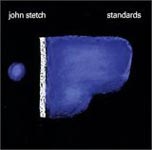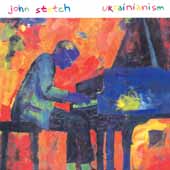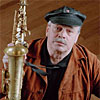Home » Jazz Musicians » John Stetch
John Stetch
A late bloomer by any stretch of the imagination, this native of Edmonton, Canada, didn’t begin playing piano until age eighteen. However, he did show an interest in music at an early age, and as a result, his father handed down his own clarinet and taught him the basics when John Stetch was nine. A few years later, Stetch switched to alto saxophone and eventually completed his first year of university on classical tenor saxophone. “When I first broached the idea of playing piano, several of my teachers actually chuckled at the idea that I could suddenly take up piano so late in life. Come to think of it, they actually discouraged me. But I knew it was something I had to do … I just felt that the piano was my higher calling. I was inspired by the rhythmic and harmonic potential, and it’s such an enjoyable instrument to work at alone.”
Stetch's life as a professional musician began when he moved to Montreal, gradually breaking into the ‘big city’ jazz scene there. After working for several years in that city, Stetch recorded his first album, Rectangle Man, in 1992, which led totours, additional recordings, and frequent airplay across Canada, including CBC’s popular “Jazz Beat.” Stetch moved to New York later that year and found himself regularly participating in the legendary Park Slope jam sessions �" an almost mandatory rite of passage in the New York jazz community. He continued to work with his own group as well as with many others as a sideman.
In 1993, Stetch decided to enter the Thelonious Monk Composer’s Competition. Stetch not only took 2nd place, but, of 260 international entries, two of his compositions placed in the prestigious competition’s top twelve.
In 1998 he won Le Grand Prix du Jazz du Maurier - at the Festival International de Jazz de Montreal, which in turn led to his debut recording for Justin Time Records. In subsequent years, Stetch was featured on NPR’s "Piano Jazz" with Marian McPartland, Branford Marsalis’ “Jazz Set." and “Weekend Edition” with Liane Hansen.
After several solo concerts, Stetch reached a pivotal moment in his career. Although he loved group playing, he realized that he now wanted to explore the challenge of building a solo piano oeuvre. To this end, in 2002 he recorded and released Ukrainianism. This recording celebrated his heritage with a blend of jazz, classical and folkloric arrangements of melodies that were familiar to him from an early age.
Read moreTags
John Stetch: TV Trio

by Graham L. Flanagan
With TV Trio, pianist John Stetch lays the groundwork for reinstituting jazz as part of the mainstream: pop-culture consciousness. Stetch, bassist Doug Weiss and drummer Rodney Green interpret 12 vintage TV theme songs. Some are instantly recognizable due to the faithfulness of the arrangements. Others are a little harder to decipher, Stetch taking inspiration from a basic element of the composition and molding it into his own, unique creation. Stetch's approach on some of the selections might ...
Continue ReadingJohn Stetch: TV Trio

by Woodrow Wilkins
Pianist John Stetch makes it clear that the Great American Songbook has a sequel: television themes. With TV Trio, Stetch presents a collection of some of his favorite themes from perhaps the most influential period of this music, the '70s and '80s. Canada-born Stetch earned a Bachelor of Music degree in Montreal and won the Prix du Jazz at the Montreal International Festival in '98. His recording and stage associations include Mark Turner, Charlie Haden, Victor Lewis and ...
Continue ReadingJohn Stetch: Blending Heritage and the Jazz Tradition

by Ken Kase
Canadian pianist John Stetch has been quietly building a catalog of fine compositions and recordings since his 1992 debut, Rectangle Man (Terra Nova, 1992). He's played in a variety of formats as a sideman and as a leader, he's fronted quartets and trios that have produced new interpretations of music from the standard jazz repertoire as well as compositions that reveal a unique and ever-evolving style.
His new CD, Bruxin' (Justin Time, 2006), marks his return to ensemble work for ...
Continue ReadingJohn Stetch Trio: Bruxin'

by Ken Kase
After recording three finely crafted and well-received solo piano albums, John Stetch returns to the trio format for the first time since Green Grove (1999). Bruxin', his first disc to feature a program comprised entirely of original compositions, finds Stetch looking back on some old gems from his past and offering brand new tunes for the future.His revisitation of “Inuit Talk," whose clipped melodic lines evoke the speech patterns of the indigenous people of the arctic ...
Continue ReadingJohn Stetch Trio: Bruxin'

by Dr. Judith Schlesinger
With this collection of eleven originals, Canadian-born pianist John Stetch enhances his reputation as an innovative performer and composer. Stetch's work is paradoxical: it's simultaneously complex and accessible, earnest and playful; full of quirky rhythms and harmonies, it's still rooted in classic swing. Bassist Sean Smith and drummer Rodney Green are essential to the whirling, welcoming energy of Bruxin', providing the ideal scaffolding for Stetch's compositions.
Stetch derives his inspiration from a wide range of influences--from the Inuit ...
Continue ReadingJohn Stetch Trio: Bruxin'

by Nic Jones
For all the hype that's been lavished on piano trios over the past few years, there are still signs of musical life in the lineup, as Bruxin' exemplifies. This programme of worthwhile music could also serve as a statement of artistic intent, implying a welcome level of individuality.
Stetch has gone for a comparatively risky option in putting together a programme of eleven original compositions for this his first trio album in a while, and the way in which the ...
Continue ReadingJohn Stetch: Exponentially Monk

by Jim Santella
A solo piano album of classic Monk compositions marks a serious study of what we all like about jazz. The music swings, it has originality, and it provides the performer much room for spontaneity. John Stetch explores each one methodically and with careful consideration.
He dampens the piano's strings, alters notes with the pedal, and combines unlikely pairs of tones. With a deep, rumbling left-hand walking bass, he gives the music a consistent foundation. From there, he's free ...
Continue Reading




























